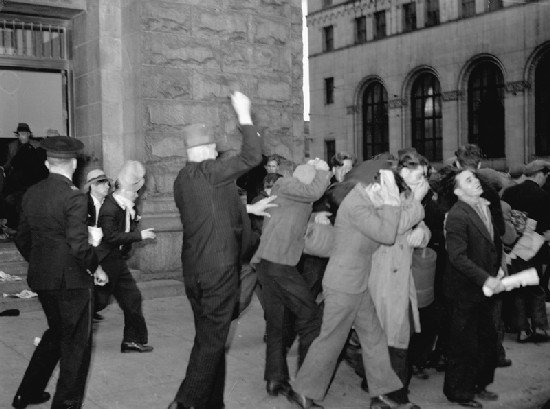By Jeffrey Monaghan
The RCMP has a long, sordid history of attacking social movements that challenge the politics of conservative, settler society. Progressive movements fighting against oppression and social inequality, for racial justice, environmental justice, and decolonization, among many other movements, have all come under the scrutiny and demobilization tactics of the RCMP.
The scope of RCMP attacks against progressive movements is extensive and a vast historical archive – held by the RCMP itself, in many cases – exposes this ideologically-motivated, racist, and outlandish treatment of social movements.
National “Security” and Social Movements
For example, in the area of national security, Gary Kinsman, Dieter Buse and Mercedes Steedman’s volume, Whose National Security?, includes over a dozen rich empirical chapters on RCMP attacks against immigrants, Catholics, feminists and a range of women’s movements, students and student clubs, teachers, queer and gender rights activists, among others. Steve Hewitt’s Spying 101 details the vast campus surveillance and suppression spanning from 1917-1997. Reg Whitaker has a number of extensive books detailing cold war security politics and their ideological practices, with Secret Service (co-authored with Gregory Kealey and Andrew Parnaby) perhaps most relevant for its focus on the RCMP and political policing. Finally, the recent collection of works by Gregory Kealey, Spying on Canadians: The Royal Canadian Mounted Police Security Service and the Origins of the Long Cold War, provides an empirically rich – and outrageously detailed cataloguing – of the RCMPs political policing since (even pre-dating) their conception in 1873 as the North-West Mounted Police.
For incisive work on social movement policing, Gary Kinsman and Patrizia Gentile’s, The Canadian War on Queers, provides an account of the RCMPs obsession with sexuality through the lens of anti-communism and subversion; as does Christabelle Sethna and Steve Hewitt’s book, Just Watch Us: RCMP Surveillance of the Women’s Liberation Movement in Cold War Canada. David Austin’s Fear of a Black Nation, explores the policing of radical Black movements in Montreal, and Andrea Conte’s critically important work demonstrates how the RCMP imported COINTELPRO operations from the US to infiltrate Black radical communities in Canada, an account also provided first-hand by Ricki Atkinson in his riveting, recent autobiography.
Labour and Liberation Movements
RCMP were also instrumental in suppressing labour movements. In When the State Trembled, Reinhold Kramer and Tom Mitchell’s provide a wide-ranging account of suppression against Winnipeg General Strike including the blunt repression from the RCMP but also attend to private police and leading capitalists in directing the violence meted out against the workers movement.
Much has been written on the RCMP and its “dirty tricks” campaign, resulting in the subsequent royal commission and creation of CSIS in the 1980s as a distinct intelligence agency. Perhaps the fullest account of the McDonald Commission was produced by journalist Jeff Sallot in Nobody Said No, which is as thorough and crucifying an account of unhampered and corrupted policing as one can find from the perspective of the liberal democratic policing model.

While popular accounts of the dirty tricks campaign focus on the FLQ, the importance of Black Liberation movements in the RCMP’s operations must be acknowledged. As Andrea Conte has underlined, the RCMP adopted wholesale aspects of the FBI’s fixation of Black Liberation movements. The subsequent targeting of radical leftist movements of which Quebec sovereigntists were seen as potential allies of but the movements had far more broad-ranging critiques of racial capitalism and colonialism.
Contemporary observers often look back at these vast histories of bigotry and sexism, baffled how police would systematically repress queer communities or student groups, or commit unthinkable violence towards entire communities, as the RCMP did with the mass internment of Japanese Canadians, or justify mass surveillance programs – like the PROFUNC program, discovered in 2000 – that classified political figures like Tommy Douglas (among many others) for mass incarceration. Yet the nativist mentalities that propelled these various campaigns by the RCMP remain present, encapsulated by systematic repression against land defenders, RCMP advocacy for mass surveillance and political disruption powers, like those contained in recent amendments to counter-terrorism powers, and, perhaps most symbolically, in the apparent growing popularity of RCMP officers wearing “Thin Blue Line” paraphernalia.
The “thin blue line” articulates a core, colonial police belief: that police are the unheralded, last defenders of civilization against an unruly, uncivilized and unappreciative social order. The highly gendered and highly racialized symbolism of “thin blue line” perfectly reflects the ideological rot at the core of policing and, most specifically for Canada, its national police force. It would be hard to identify an organization other than the RCMP with such a thorough record of violence, transgression and inhumanity that continues, in spite of this historical record, to promote itself as virtuous – and even as a victim.. Given the abysmal record of political policing and an even more abysmal record of police reform, as recently documented with extensive detail in the Mass Casualty Commission, residents in Canada have every reason to demand the RCMP be disbanded and dismantled.
The examples noted here are only starting points and must be read in conjunction with the colonizing force that has propelled much of the RCMP and NWMPs core functions. These works of research establish an uncontroversial and uncontestable record: the RCMP are a political police force that protect and reproduce an ideological and material status quo. Much of the works above characterize the dominant culture of the RCMP as a nativist and colonial character, marking foreigners and outsiders as threat to the economic, racial, and symbolic order.